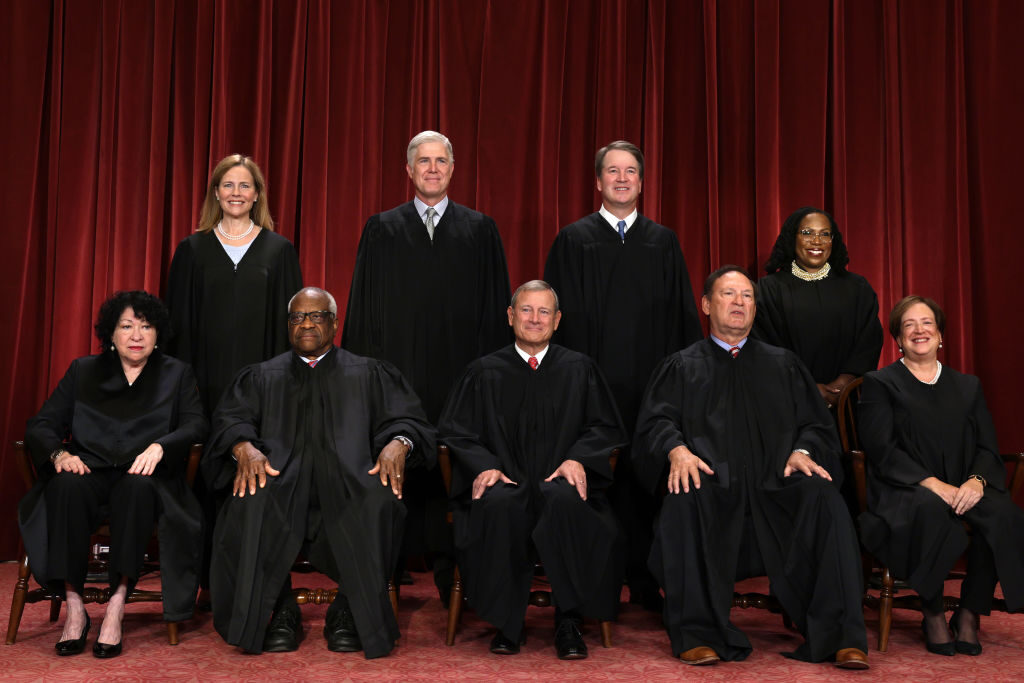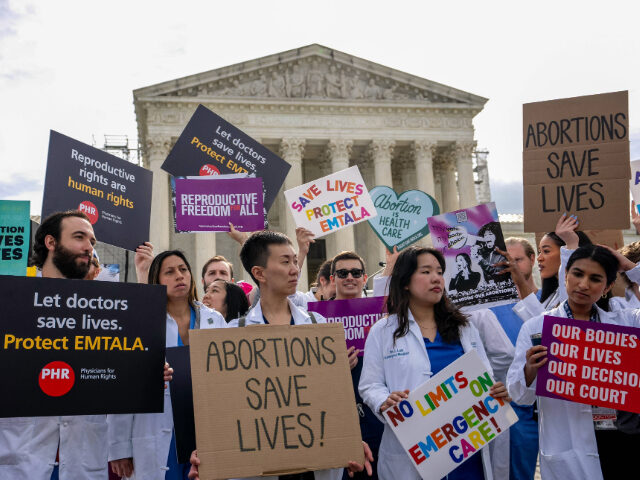The Supreme Court on Thursday allowed the Biden administration to require emergency room doctors to perform abortions in medical emergencies under its new interpretation of the Emergency Medical Treatment and Labor Act of 1986 (EMTALA).
The court voted six to three to dismiss the case as improvidently granted and vacated a stay from the Ninth Circuit, which had blocked a lower court ruling allowing the Biden administration’s interpretation of EMTALA to override state law. The court did not rule on the merits of the case, meaning the appeal will continue in the Ninth Circuit, and the case could potentially end up back before the high court. The court released the result a day after the decision was accidentally posted to the Supreme Court’s website.
Case Details
The case surrounds the Biden administration’s attempt to require emergency room doctors to perform abortions under its new interpretation of EMTALA. After the Supreme Court overturned Roe v. Wade, which had invented a constitutional right to abortion, the Department of Health and Human Services (HHS) issued guidance claiming that EMTALA requires doctors to perform abortions on patients in emergency rooms when it is “the stabilizing treatment necessary” to help in a medical emergency. Under the guidance, hospitals not in compliance could lose funding and the ability to participate in Medicaid.
After the HHS issued its guidance in July of 2022, the Biden administration sued the State of Idaho over its pro-life law, alleging that it is not in compliance with the federal government’s reading of EMTALA. A district court blocked the state’s pro-life law, an order which the U.S. Court of Appeals for the Ninth Circuit stayed. But, within days, the en banc Ninth Circuit vacated its panel’s stay opinion and granted en banc review. The State of Idaho then appealed the decision to the Supreme Court. The Supreme Court subsequently took the extraordinarily rare step of granting “cert before judgment” — shorthand for the Supreme Court granting review (called a writ of certiorari) before the appeals court finishes deciding the appeal.

United States Supreme Court (Alex Wong/Getty Images)
Idaho argued in April that Congress did not write EMTALA to require emergency room physicians to perform abortions. Instead, the state argued that the law’s original intent was to prevent “patient dumping,” when hospitals refuse to treat patients who are unable to pay for emergency services. The law, as written by Congress, explicitly requires hospitals to provide stabilizing care for both pregnant women and their unborn babies in emergencies, regardless of whether they are able to pay for services, and makes no mention of abortion.
The United States argued that Idaho’s pro-life law — which makes it a felony for a doctor to perform an abortion unless it is necessary to prevent a mother’s death — is narrower than its reading of EMTALA. It should be noted that Idaho law does not consider the removal of a miscarriage or ectopic pregnancy an elective abortion.
The Decision
Chief Justice John Roberts and Justices Brett Kavanaugh and Amy Coney Barrett, along with liberal-leaning Justices Elena Kagan and Sonia Sotomayor, voted to dismiss the case and vacate the stay. Justice Ketanji Brown Jackson wrote an opinion in favor of vacating the stay but objected to dismissing the case. Conservative-leaning Justices Samuel Alito, Neil Gorsuch, and Clarence Thomas dissented.
“…Idaho’s arguments about EMTALA do not justify, and have never justified, either emergency relief or our early consideration of this dispute,” Justice Kagan wrote in an opinion joined by Sotomayor and in part by Jackson:
With this Court’s writ of certiorari dismissed, the lower courts can proceed with this litigation in the regular course. And with this Court’s stay dissolved, the District Court’s preliminary injunction will again take effect. That will prevent Idaho from enforcing its abortion ban when the termination of a pregnancy is needed to prevent serious harms to a woman’s health.
Justice Jackson wrote an opinion agreeing with the court’s order to lift the stay but disagreeing with the decision to dismiss the case “because, in my view, the Court is wrong to dismiss these cases as improvidently granted”:
If anything, the need for a clear answer to the Supremacy Clause question has only increased in the intervening months. Other States across the country have enacted legislation that gives rise to the same sort of legal conflict that Idaho has created. This pre-emption issue is not going away anytime soon and will most certainly return to this Court.
…
Nor has there been any change in today’s cases that might eliminate or undermine the need for this Court’s review.
Justice Barrett wrote an opinion joined by Roberts and Kavanaugh, stating:
…[C]ontrary to Idaho’s concerns at the stay stage, the Government’s interpretation of EMTALA does not purport to transform emergency rooms into “federal abortion enclaves governed not by state law, but by physician judgment, as enforced by the United States’s mandate to perform abortions on demand.”
“Nor does it purport to deprive doctors and hospitals of conscience protections. Thus, even with the preliminary injunction in place, Idaho’s ability to enforce its law remains almost entirely intact,” she wrote.
Barrett also explained that the Court’s decision to grant certiorari before judgment was “premised on the belief that Idaho would suffer irreparable harm under the injunction and that these cases were ready for the Court’s immediate determination”:
Since then, briefing and oral argument have shed more light on this case than in the nature of things was afforded at the time the Court considered petitioners’ emergency applications. I am now convinced that these cases are no longer appropriate for early resolution.
Justice Alito wrote a dissenting opinion joined by Thomas and Gorsuch, calling the court’s decision to dismiss the case “baffling”:
Nothing legally relevant has occurred since January 5. And the underlying issue in this case—whether EMTALA requires hospitals to perform abortions in some circumstances—is a straightforward question of statutory interpretation. It is squarely presented by the decision below, and it has been exhaustively briefed and argued.
“Apparently, the Court has simply lost the will to decide the easy but emotional and highly politicized question that the case presents. That is regrettable,” he added.
Alito also wrote that Idaho’s injury is “not abstract.”
“[I]t is very likely that the preliminary injunction will lead to more abortions, including in at least some cases where the fetus is viable,” he wrote. “The State of Idaho wants to prevent that; the preliminary injunction stands in its way. Isn’t that enough to constitute irreparable harm?”
Alito further called the government’s preemption theory “plainly unsound”:
Far from requiring hospitals to perform abortions, EMTALA’s text unambiguously demands that Medicare-funded hospitals protect the health of both a pregnant woman and her “unborn child.” And even if there were some ambiguity in the statutory text, we would be obligated to resolve that ambiguity in favor of the State because EMTALA was enacted under the Spending Clause, and as we have held time and again, conditions attached to the receipt of federal funds must be unambiguous.
Alito also called the potential implications of allowing the federal government to preempt state law “far-reaching.” He wrote:
Under the Government’s view, Congress could apparently pay doctors to perform not only emergency abortions but also third-trimester elective abortions or eugenic abortions. It could condition Medicare funds on hospitals’ offering assisted suicide even in the vast majority of States that ban the practice. It could authorize the practice of medicine by any doctor who accepts Medicare payments even if he or she does not meet the State’s licensing requirements.
While the Government is not troubled by the potential consequences of its preemption argument, Congress was sensitive to state prerogatives. The Medicare Act, in which EMTALA is situated, disclaims any construction that would “authorize any Federal officer or employee to exercise any supervision or control over the practice of medicine or the manner in which medical services are provided…” This disclaimer evidences a desire to “minimize federal intrusion” into state healthcare regulation.
Ruling Reaction
Idaho Attorney General Raúl Labrador held a virtual press conference after the Supreme Court released its result, appearing optimistic about what the dismissal means for the future of the case and noting that the case will likely end up before the high court again. A similar case surrounding EMTALA is currently being litigated in Texas.
“While the case proceeds, the Biden administration’s concessions that EMTALA will rarely override Idaho’s law caused the Supreme Court to ask the Ninth Circuit for review in light of the federal government’s change in position,” Labrador said:
Justice Barrett wrote that those concessions mean that Idaho’s Defense of Life Act remains almost entirely intact. And Ninth Circuit’s decision should be easy, as Justice Alito explained well, that Biden administration’s preemption theory is “plainly unsound.” I remain committed to protecting unborn life and ensuring women in Idaho receive necessary medical care. And I will continue my outreach to doctors and hospitals across Idaho to ensure that they understand what our law requires. We look forward to ending this administration’s relentless overreaching to Idahoans’ right to protect and defend life.
Labrador added that he feels “pretty strongly that we’re going to win this case in the end.”
“We feel good about where we sit today, and we look forward to the Ninth Circuit actually reading the tea leaves from the Supreme Court and understanding that the Biden Administration’s overreach needs to end,” he added.
Deputy director of the American Civil Liberties Union (ACLU) Reproductive Freedom Project Alexa Kolbi-Molinas pitched the result as a pro-abortion loss. The ACLU filed an amicus brief in the case.
“It is now clear that the Supreme Court had the opportunity to hold once and for all that every pregnant person in this country is entitled to the emergency care they need to protect their health and lives, and it failed to do so,” Kolbi-Molinas said in a statement.
She added:
The Court’s refusal to clearly affirm the rights of all pregnant people to emergency abortion care, and put an unequivocal end to extremist attacks by anti-abortion politicians on this essential health care, is a dangerous preview for what could come. In fact, several justices provided a roadmap for just how they would strip pregnant people of this basic right when this case comes back to the Court.
Leading pro-life organization Susan B. Anthony (SBA) Pro-Life America called the result a “setback” but vowed to continue fighting for moms and babies.
SBA State Policy Director Katie Daniel said in a statement:
Today’s Supreme Court decision is a setback, but our fight for babies and moms continues. With its sound “life of the mother” provision that allows pregnant women to receive emergency care, Idaho’s pro-life law is consistent with EMTALA which requires hospitals to provide stabilizing treatment to both mothers and unborn children. Under Attorney General Raul Labrador’s leadership, we are confident Idaho will eventually prevail on the merits of this case.
The Biden administration’s EMTALA charade is a PR stunt to spread the lie that pro-life laws prevent women from receiving emergency care. It is clear that the abortion lobby has created confusion on this fact for political gain and Democrats have to rely on this false talking point because their agenda for all-trimester abortion is wildly unpopular with support from only 10% of Americans.
The case is Moyle v. United States, No. 23-726 in the Supreme Court of the United States.
Katherine Hamilton is a political reporter for Breitbart News. You can follow her on X @thekat_hamilton.

COMMENTS
Please let us know if you're having issues with commenting.